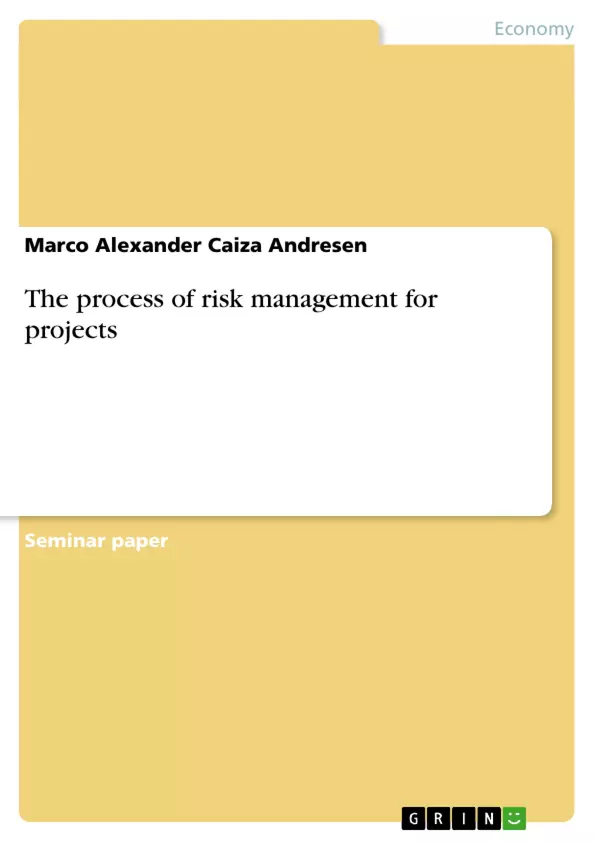In consequence of the steadily increasing demand for projects there is an increasing demand for project risk management. Due to the high complexity of project work and its planning there are many possibilities where risks can endanger the success or even the practicability of a certain project. Hence, there cannot be enough emphasis on project risk planning for the smoothly flow of project progression. Within projects the term risk is defined as “[…] the cumulative effect of the chances of uncertain occurrences adversely affecting project objectives” (Wideman 1992, p. I-4).
The thorough examination of possibilities for avoidance, elimination or at least for a significant reduction of these risks should lead to a better performance of the ultimate project. The question why some projects succeed while others fail is important to every business. To strengthen the possible future project success, project risk management has to be effectively applied to every project process. Identifying project risks and appropriately cope with them through the development of adequate strategies is the aim of the project risk management process. Having this in mind, the intention of this term paper is to analyze the process of project risk management. After a short introduction, by thorough study of literature in the second chapter the main steps of different approaches of the risk management process in projects will be indicated and compared. After that the most common tools to be used within this process will be indicated before, finally, possibilities for the extension of the project risk management process towards a broader management process will be discussed. In the last chapter a conclusion will be drawn and an answer given to the questions on which are the critical steps towards an effective risk management process and which specific factors have to be focused to overcome the threats concerning management of projects. The work is done on a more general basis to understand the character of the risk management process, giving possibility to an application to many different kinds of projects.
Inhaltsverzeichnis (Table of Contents)
- I. Introduction
- 1.1 Purpose of the Paper
- II. Main Part
- 2.1 Different Approaches to Project Risk Management Processes
- 2.2 Tools for Project Risk Management
- 2.3 Extending the Project Risk Management Process.
- III. Conclusion
Zielsetzung und Themenschwerpunkte (Objectives and Key Themes)
This term paper analyzes the process of project risk management. The objective is to understand how project risk management can be effectively applied to every project process, ensuring a greater chance of success. This paper explores the key steps involved in different approaches to project risk management, reviews common tools used, and investigates possibilities for extending the process to a broader management level.
- Different approaches to project risk management processes
- Tools used in the project risk management process
- Extending the project risk management process
- Identifying and managing risks in projects
- The importance of a comprehensive project risk management strategy
Zusammenfassung der Kapitel (Chapter Summaries)
- I. Introduction: This chapter introduces the concept of project risk management and its importance in the context of increasing project complexity and demand. It defines risk in the context of projects and highlights the need for thorough risk planning to ensure smooth project progression. The chapter then outlines the purpose of the paper, which is to analyze the process of project risk management.
- II. Main Part: This section delves into the core elements of project risk management. It begins by discussing different approaches to the project risk management process, comparing and contrasting their key steps and phases. The chapter then outlines common tools used in the process. Finally, it explores possibilities for extending the project risk management process to a broader management context.
Schlüsselwörter (Keywords)
This paper focuses on the key concepts and tools associated with project risk management. Key themes include risk identification, risk analysis, risk response, risk management process, project success, and risk management strategy. Important tools mentioned in the paper include risk assessment, risk classification, and risk handling.
Frequently Asked Questions
How is "risk" defined in project management?
Risk is defined as the cumulative effect of uncertain occurrences that could adversely affect project objectives, such as time, cost, or quality.
What is the main goal of the project risk management process?
The goal is to identify potential threats early and develop strategies to avoid, eliminate, or significantly reduce their impact on the project's success.
What are the critical steps in an effective risk management process?
The process typically involves risk identification, risk analysis (assessment), and risk response (handling and strategies).
Which tools are commonly used for project risk management?
Common tools include risk assessment matrices, risk classification systems, and various risk handling techniques to manage uncertain outcomes.
Why do some projects fail despite risk planning?
Failure often occurs due to high complexity, inadequate strategy development, or failing to apply risk management effectively throughout the entire project lifecycle.
- Citation du texte
- Diplom-Kaufmann, M.A. Marco Alexander Caiza Andresen (Auteur), 2006, The process of risk management for projects , Munich, GRIN Verlag, https://www.grin.com/document/73819



